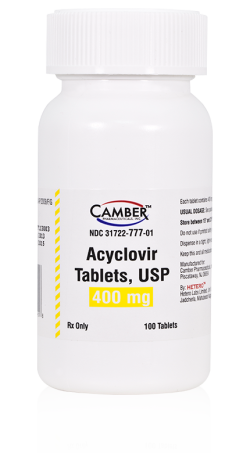Acyclovir, Famciclovir, or Valacyclovir are antiviral agents that are usually used to treat herpes simplex virus infections and to reduce the severity of infections caused by herpes zoster virus. There is much confusion regarding the use of Acyclovir during pregnancy as the drug may be harmful.

In this blog, we will slip into the things you must know about the use of Acyclovir when pregnant.
What is Acyclovir?
Acyclovir is an antiviral medication that is sold under different brand names such as Zovirax. Acyclovir is used to treat and prevent genital herpes infection (herpes simplex virus), cold thrush, shingles, and chicken pox.
Acyclovir is available as oral tablets, topical ointments, and intravenous injections. Acyclovir is a prescription-only drug so you can only buy it if you have a valid prescription.
Acyclovir is not a complete cure for herpes simplex virus type 1 and 2 and other infections as these may return after a certain period. Acyclovir can treat symptoms of genital herpes and cold sores. It can relieve pain and boost the healing of blisters and sores. Acyclovir is also used in people with a weak immune system like Human Immunodeficiency Virus (HIV).
Acyclovir and Genital Herpes Simplex Virus
Herpes simplex virus infections are quite common viral infections. Around 40 % of infected people encounter frequent recurrence of infection within the initial year of disease onset. The prevalence of herpes simplex virus infection is high and around 40 % of people with genital herpes face around 6 recurrences in the first year of disease onset.
Herpes Simplex Virus Infection in Pregnant Women
Over 1 % of susceptible women acquire herpes simplex infection during the first trimester of pregnancy. If a pregnant woman is diagnosed with chicken pox, genital herpes or the woman has a history of recurrent genital herpes, the doctor may prescribe antiviral drugs such as Acyclovir medication during pregnancy.
Herpes or herpes simplex virus infection is a common viral infection. If pregnant women are diagnosed with herpes simplex virus infection during their neonatal checkups, the baby can be at risk of getting neonatal herpes.
While herpes simplex virus infection is unlikely to be spread in the uterus, it can be transferred to the newborn during vaginal delivery. That is why it is extremely vital to get proper treatment and preventive measures.
Doctors or healthcare professionals recommend antiviral drugs such as Acyclovir in order to suppress the genital lesion outbreak. However, it does not eradicate the viruses from the body, it significantly lessens the severity and intensity of symptoms and also shortens the duration of herpes outbreaks.
Acyclovir For Genital Herpes And Other Viral Infections During Pregnancy

The USFDA (US Food and Drug Administration) has categorized Acyclovir as a pregnancy category B drug. It means the study conducted regarding the same on animals shows low risk however there are no sufficient and well-controlled studies on pregnant women.
The American Sexual Health Association stated that FDA had not approved any medication for the treatment of herpes infections in pregnant women. However, physicians prescribe Acyclovir treatment during the last trimester of pregnancy if the benefits of the drug outweigh the potential risks.
Suppressive therapy in the last trimester of pregnancy has been shown to lessen the frequency of cesarean delivery in women with recurrent genital herpes. It reduces the frequency of recurrent infections.
The American Academy of Family Physicians noticed that using Acyclovir during the first trimester Is not linked to birth defects. It is suggested to use Acyclovir as the antiviral drug of choice during early pregnancy to treat genital herpes simplex virus and other infections. At the same time, studies about the effects of Acyclovir during the second and third trimesters are limited.
Why Acyclovir is Prescribed for Pregnant Women
Acyclovir or Valacyclovir is prescribed for pregnant women when they have a primary genital herpes infection. Primary infection means women are exposed to the herpes simplex virus for the first time. Primary infection can be serious or life-threatening and may cause complications in pregnancy.
A rare infection known as Varicella Pneumonia in pregnant women may also require Acyclovir treatment. Varicella pneumonia is a serious infection that needs proper treatment. While prescribing Acyclovir during pregnancy, your healthcare provider discusses about the benefits and possible risks associated with your condition and prescription drug.
How Much Acyclovir is Safe for Pregnant Women?

The dosage and amount of Acyclovir for pregnant women are determined by your doctor depending on the severity of your condition and other vital parameters. Usually, doctors prescribe Acyclovir during pregnancy when you have the first episode of herpes.
Your doctor or healthcare provider may prescribe taking Acyclovir every day during the last 4 weeks of pregnancy in order to reduce the risk of outbreak and to prevent the infection from spreading to the newborn.
There may be a theoretical risk of teratogenicity when the drug is used during the first trimester. If the pregnant woman is present within 24 hours of the onset of a rash and gestation is more than 20 weeks, Acyclovir can be used safely.
What Do Studies Say About The Impact Of Acyclovir When Pregnant
Study 1
Pregnancy outcomes following Systemic Prenatal Acyclovir Exposure herpes infections are common in women during reproductive age. A retrospective cohort study collected information from three national registries in Denmark. The study was conducted to determine if exposure to Acyclovir during pregnancy cause major birth defects or not.
They selected a cohort of all live births between 1996 to 2008. The writers pulled out data from all cohort mothers for prescriptions of oral Aciclovir as well as topical Acyclovir that was filled from 4 weeks before conception through birth. The registry was unable to seize data from over-the-counter formulations of topical Acyclovir.
Birth defects were recognized through National Patient Register which records all diagnoses assigned to people during outpatient visits, hospital admissions, and emergency departments. Data were accessed for the study period and major birth defect diagnoses were collected with the help of a surveillance classification system.
During this process, infants diagnosed with birth defect syndromes, minor defects, genetic disorders, chromosomal disorders with known causes, and congenital viral infections which may cause viral infections are excluded.
In order to avoid confounding, they gathered maternal data on medical conditions including immunodeficiency status, history of sexually transmitted infections smoking status, diabetes mellitus, exposure to antibiotics and corticosteroids during the first trimesters, and history of birth defects in siblings.
Results Of The Study
A considerable birth defect in the first year was detected in 19, 960 out of 837795 live births. There is no difference in the rate of birth defects between the women who received antivirals and who did not. The outcomes were the same when the examination was limited to the use of Acyclovir. Risk estimates were the same for Acyclovir and Valacyclovir however there were comparatively few exposures informed to Valacyclovir and Famiacyclovir.
Conclusion Of The Study
The study concludes that the use of Acyclovir during the first trimester of pregnancy does not raise birth defects and it should be the drug of choice during early pregnancy.
Study 2
Animal studies demonstrate that Acyclovir readily crosses the placenta. When Acyclovir was administered to animal models throughout the period of major organogenesis, no teratogenicity was observed.
Precautions To Take While Taking Acyclovir In Pregnancy
If you are prescribed to take oral acyclovir during pregnancy you must take some precautions to ensure safety, get the maximum benefits of the medicine and avoid any kind of complications.
- Do not take this drug if you experience any allergic reaction.
- Do not exceed or reduce the dosage prescribed by your doctor.
- Drink plenty of water when you are taking Acyclovir.
- Tell your health care providers if you have liver, kidney nerve, or electrolyte abnormalities.
Potential Side Effects Of Acyclovir
Potential side effects of taking Acyclovir medication include headache, nausea, fever, diarrhea, changes in vision, and hair loss. These are mild side effects of the drug that usually resolve within a few days and do not require medical help.
However, you may need your doctor’s attention if serious side effects occur such s allergic reactions, extreme sensitivity to the sun, chest pain, difficulty while passing urine, bloody diarrhea, difficult sleep, and numbness.
Are There Any Significant Effects Of Acyclovir On The Fetus?

Make sure you only take Acyclovir or other antiviral drugs if your doctor prescribes you. Your healthcare provider may prescribe you Acyclovir treatment if you are diagnosed with varicella zoster or herpes simplex virus or if you have recurrent genital herpes.
Studies say there is no increased risk of congenital disabilities in fetuses if the mothers take Acyclovir antiviral treatment during pregnancy. The rate of congenital disabilities noticed in these pregnancies was not considerably different from those who were not taking acyclovir.
Every pregnancy carries a 3 to 5% chance of having birth defects. It is preferred as a background risk. depending on the studies performed and the information available Acyclovir or Valacyclovir does not enhance the chances of major birth defects.
The Centers of Disease Control and Prevention along with the manufacturer evaluated the possible risks of Acyclovir on the developing baby. No increase in major birth defects was found in more than 500 births.
Additionally, a separate study performed to evaluate the same does not find an increase in birth defects in over 1500 infants exposed to Acyclovir medication and over 200 infants who were exposed to Valacyclovir medication during pregnancy.
The use of the antiviral drug Acyclovir in the last trimester of pregnancy is not well studied to determine how it may impact pregnancy outcomes, pretern delivery, or low birth weight.
The risk associated with drug exposure to the fetus is not clear as human studies are not sufficient to reach conclusion and animal studies are either lacking or positive for fetal risk. However, the benefits of Acyclovir may justify the potential chances of risks.
In case of a genital lesion outbreak, your health care provider may prescribe your Aciclovir in order to protect your baby. If you experience any adverse effects of this drug check with your doctor and seek medical help.
Closing Words
Acyclovir is a widely used antiviral drug, particularly for herpes simplex virus and varicella zoster virus. Accidental exposure to Acyclovir during early pregnancy may lead to maternal and physician anxiety.
Acyclovir has not been sufficiently studied in a large number of pregnant women. Also, there is the absence of FDA approvals for gestational use unless the benefits of the medicine significantly outweigh the potential harm to the fetus.
However, some studies show Acyclovir is not associated with increased adverse effects or birth defects when used during pregnancy. Acyclovir can be safe to use when prescribed for designated situations such as maternal varicella pneumonia or dispersed primary herpes simplex infections.




